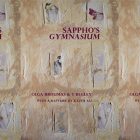Remembering the Future
![]()
In Strongmen: Mussolini to the Present, historian Ruth Ben-Ghiat explains how the “Heil Hitler” salute and similar rituals help an authoritarian leader “train the bodies and minds of his people,” replacing the “humanizing handshake” with a gesture that emphasizes “their bond with the leader and their distance from everyone else”—including one’s own family. Ben-Ghiat writes, “Even within families, the rigid-arm salute could interfere with intimacy. Ingeborg Schäfer recalled that it kept her from holding hands properly with her father, a senior SS official, who saluted colleagues throughout their walks.”
We can contrast Schäfer’s recollection of childhood in a fascist state with Natalia Ginzburg’s recollections in Family Lexicon, which begins with a vivid sketch of her father, Giuseppe Levi. At once, we know him through his caustic, excited language:
At the dinner table in my father’s home when I was a girl if I, or one of my siblings, knocked a glass over on the tablecloth or dropped a knife, my father’s voice would thunder, ‘Watch your manners!’
If we used our bread to mop up pasta sauce, he yelled, “Don’t lick your plates. Don’t dribble. Don’t slobber!”
For my father dribble and slobber also described modern painting, which he couldn’t stand.
He would say, ‘You have no idea how to behave at the table! I can’t take you lot anywhere.’
Here is a man whose mind—whose eccentric language—could not possibly be “trained” by anyone, least of all Benito Mussolini, who became the prime minister of Italy when Ginzburg was six years old. Dominating and implacable, Giuseppe Levi occupies the center of Ginzburg’s novel, in which, with a “profound intolerance for any fiction,” she tells how she and her part Jewish, antifascist family endured the years of Mussolini’s dictatorship and then World War II.
They endured, it seems, in a clamor of language—argumentative, idiosyncratic—through which, even years later, living in different cities, some of them outside Italy, Ginzburg and her four siblings maintained their intimacy:
All it takes is for one of us to say ‘We haven’t come to Bergamo on a military campaign,’ or ‘Sulfuric acid stinks of fart,’ and we immediately fall back into our old relationships, our childhood, our youth, all inextricably linked to those words and phrases . . . . Those phrases are the basis of our family unity and will persist as long as we are in the world, re-created and revived in disparate places on the earth wherever one of us says, ‘Most eminent Signor Lipmann,’ and we immediately hear my father’s impatient voice ringing in our ears: ‘Enough of that story! I’ve heard it far too many times already!’
Ginzburg wrote Family Lexicon in the early 1960s when she was living in London with her second husband, and in this paragraph I feel all her longing for her raucous childhood home. It may have been a childhood lived in fascist Italy, but it was her one and only childhood.
Since reading Ginzburg’s novel last year, I have wanted to identify and investigate my own family lexicon, the basis of our unity. In the pressure of our semi-quarantine in a two-bedroom Brooklyn apartment with no yard and not much of a view, however, our most noticeable lexicon is fractious, dispiriting: the children shouting STOP!! at each other; my weary, rote response: “Tell your brother what you want him to do, not what you want him to stop doing”; and my husband’s frequent admonishments of the children to leave me alone because “Mommy has work to do,” much of which I get done late at night or on the weekends as so much of my weekdays are dedicated to my roles as mediator, math tutor, writing tutor, and sole member of the local IT department.
The lexicon I know best, it turns out, is a lexicon of memory. My memory of the toddlers I once had, for example, animates my endearments of my children: “You are my culie pie,” which my older son once said to me and “You are my Ro-Ro,” which was once my younger son’s mispronunciation of the name of his stuffed tiger, Rousseau. I feel wistful for the year not so long ago when the older boy, as jocular as Han Solo addressing Luke in Star Wars, called his younger brother “kid.”
“Remember the future,” writes Masha Gessen in their 2016 New York Review of Books piece “Autocracy: Rules for Survival.” But I am failing. Though perhaps we have dodged the worst outcome—for the time being, at least—in the midst of the current catastrophe, I cannot imagine the future any further than a week or so. Meanwhile, the present is repetitive, stale. And so, like Ginzburg, who in Family Lexicon says very little about her life with her children and first husband, Leone Ginzburg, who was imprisoned and tortured to death by the Nazis in Rome, I look to the past, to the language of my childhood. Writes Ginzburg of the language of her childhood, “Those phrases are our Latin, the dictionary of our past, they’re like Egyptian or Assyro-Babylonian hieroglyphics, evidence of a vital core that has ceased to exist but that lives on in its texts, saved from the fury of the waters, the corrosion of time.”
What from my childhood lives on? Among the songs I still sometimes sing to my children, the only one I remember my mother singing to me: “You are my sunshine, / My only sunshine . . . .” The story of a haunted house that my cousin used to tell and that I have passed on to my children, which begins: “In the deep dark universe there was a deep dark world, and in the deep dark world there was a deep dark city . . .” The story is a joke that ends with the discovery of jellybeans in a closet, but the image of the deep dark world remains disquieting to me.
So much more is lost, though, such as the run-down cottage in New Hampshire where my cousin first told me the tale of the deep dark house. Beginning in the late 1800s, vacationers signed their names on the living room walls, which inspired my cousins in the 1970s and ’80s to cover every interior surface of the cottage with graffiti, nearly all of it lost when the cottage was knocked down. “Danny is the Fonz,” scrawled on the wall of an upstairs bedroom, is all I still remember. Lost, too, are the voices of those who have passed. There was my great-grandmother’s way of speaking that I thought was just the way old people spoke (she may have lived to 102; no one can be sure when she was born) and that only now have I realized was her Polish accent. And there was a way my grandmother punctuated her work in the kitchen with a little staccato hum: “Hm, hm.” I hear it in my mind so clearly, but there is no way to pass on such an incorporeal memory to anyone who wasn’t there.
Maybe those who know our family lexicon best are my children, who won’t know what they know until years from now, when they talk to each other about their one and only childhood in Brooklyn, including these months of the pandemic and whatever comes after. Maybe they will remember the names of the flowers I taught them, the names of the phases of the moon. Maybe they will remember how I continued to call them “Baby” long after they were half-grown. I want them to remember, too, as much as I can think to tell them about the past—who and where they came from. Taking care to pass these memories along, I now see, is another way to remember the future.



